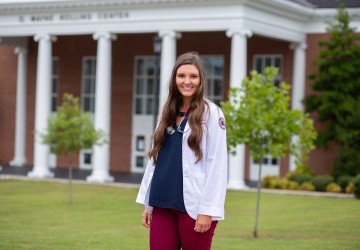Helping others heal is a noble pursuit—and there are a number of avenues that can help you become a vital member of the healthcare team. You could become a nurse and help in the healing process with continuous one-on-one care. You could become an administrator to ensure the entire operation runs smoothly so patients can continue to get care. You could even spend years and years in medical school, accumulating mountains of student debt, to one day become a doctor and actually practice medicine.
Or, you could learn how to practice medicine, provide innovative treatments and make a very real difference in the lives of your patients in much less time with a lot less debt … as a physician assistant.
What isn’t a physician assistant?
It’s OK to call a physician assistant a PA, but it’s incorrect to call one a “physician's assistant.” The term for someone that actually performs clinical tasks for a doctor, such as taking vital signs or drawing blood, is a “medical assistant.” These are just a few of the very real differences between what is done by a medical assistant vs a physician assistant’s day-to-day duty. And while some do choose to complete a one- to two-year formal training program, these health care workers are not required to receive formal training or to be licensed as a medical assistant.
What is a physician assistant? Is a physician assistant a doctor?
Similar to a doctor, a PA is qualified to provide primary care to patients. In fact, PAs can perform about 80 percent of the functions a physician can. There’s really quite a bit of overlap between the two roles, physician assistants vs doctors. However, one key difference is that PAs often assist doctors during surgical procedures, but they themselves are not actually licensed to perform surgery.
A PA works in partnership with, and under the supervision of, a licensed physician. But the doctor doesn’t need to be on the premises while the physician assistant is treating a patient. As long as the physician is reachable by phone, should the need for a consultation arise, the PA is fully qualified to diagnose and treat illnesses and injuries.
What does a physician assistant do?
About 36 percent of physician assistants work in primary care, making them the first point of patient contact in a doctor’s office or health clinic. But what is involved in the day in the life of a physician assistant? A lot, actually. In their roles as primary care providers, physician assistant job duties often include (but are not limited to):
- Performing patient exams
- Taking patient histories
- Diagnosing illnesses and injuries
- Suturing wounds
- Ordering tests
- Interpreting lab results and imaging studies
- Administering treatment
- Prescribing medications
- Monitoring progress
Can PAs specialize like doctors?
Absolutely. If you’ve got a particular area of interest, such as family practice, dermatology, or rheumatology, you can choose to focus your career there. There are any number of physician assistant specialties. In fact, approximately two-thirds of physician assistants are found in sub-specialty areas including:
- Surgery—Surgical PAs are qualified to put in chest tubes, cut and drain abscesses, and work alongside the surgeon, anesthesiologist, and surgical nursing team. The operating room is the one area in which PAs do function as lead assistants to doctors.
- Emergency Medicine—ER physician assistants can be found performing wound care, treating sprains and strains, refilling medications, and treating colds and other infections. In some hospitals, they may start central IV lines, insert breathing and surgical drainage tubes, and treat major emergencies as part of a health care team.
- Orthopedics—Orthopedic PAs assist in surgical procedures on bones, make and remove casts, treat dislocated bones, and perform imaging tests.
- Hospital Care—Physician assistants who are “hospitalists” are typically responsible for evaluating, treating, and monitoring seriously ill patients with complex ailments who require extensive care.
How much do physician assistants make?
As of September 2020, the U.S. Bureau of Labor Statistics (BLS) puts the median annual salary for PAs at $112,260. The BLS also reports that this occupation has an excellent job outlook. Employment of physician assistants is projected to grow 31 percent from 2019 to 2029, which is much faster than the average for all occupations.
“As demand for healthcare services grow, physician assistants will be needed to provide care to patients,” states the BLS. As the large baby boom population ages, the need for medical care increases. Because physician assistants can provide many of the same services as doctors, they’ll have a growing role in providing healthcare services. The BLS further notes that PAs can be trained more quickly than physicians, which is also advantageous.
How do I become a physician assistant?
Unlike a medical doctor who undergoes 10+ years of schooling and residency to practice, a physician assistant can practice after earning a four-year degree followed by a master's degree from a physician assistant training program that is accredited by the Accreditation Review Commission on Education for the Physician Assistant (ARC-PA).
Then to obtain a PA license and become a certified physician assistant, you’ll need to successfully complete a one-year clinical rotation as well as pass the Physician Assistant National Certifying Examination (PANCE), which the National Commission on Certification of Physician Assistants (NCCPA) administers. Once you enter practice, you’ll also be required to complete ongoing continuing education classes and undergo regular re-testing of your medical skills.
Now that we’ve explored what physician assistants do, it’s clear that PAs are not assistants to doctors. In fact, as we discovered above, physician assistants actually have a wide variety of responsibilities. If you also have a desire to help others and are interested in becoming a physician assistant, see if our graduate physician assistant degree program or pre-physician assistant undergraduate track at University of the Cumberlands is the right choice for your career goals.

